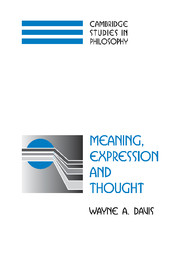6 - Reference
Published online by Cambridge University Press: 20 July 2009
Summary
This chapter will briefly introduce the concept of speaker reference, distinguishing it from the markedly different notion of word reference. When S said “The president is tall,” he may have been referring to Al Gore even though the words he uttered referred to George Bush. This difference between word reference and speaker reference may have occurred because of a false belief about who is president, a false belief about what “president” means, or a verbal slip. Alternatively, the divergence may have been intentional, as when S is using a code, speaking loosely or figuratively, acquiescing in someone else's unconventional usage, or conveying his feelings about who should be president.
A constraint on any theory of word reference is satisfaction of what I call the “disquotation formula”: if it refers at all, “Φ” refers to Φ. “Detroit” (the name) refers to Detroit (the city), “Napoleon” refers to Napoleon, and so on. Putnam and Horwich have suggested that a theory of word reference would consist of nothing but such tautologies. A Davidsonian might say that a theory of word reference is a recursive theory entailing an instance of the disquotation formula as a theorem for each referring term in the language. Most would like a theory explaining why “Φ” refers to Φ. No such theory is remotely possible for speaker reference.
- Type
- Chapter
- Information
- Meaning, Expression and Thought , pp. 100 - 122Publisher: Cambridge University PressPrint publication year: 2002



